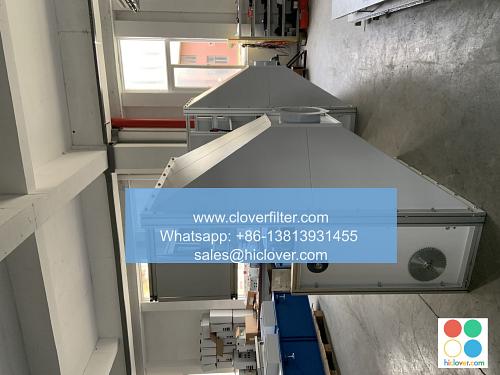Boeing’s Commitment to Clean: The Use of Automatic Roll Air Filters in Aerospace Manufacturing

Boeing, a world leader in the aerospace industry, has long been committed to maintaining the highest standards of cleanliness in its manufacturing facilities. The company recognizes that clean air is essential for producing high-quality aircraft components, and to achieve this, it has implemented the use of automatic roll air filters in its manufacturing processes. In this article, we will explore the role of these filters in Boeing’s aerospace manufacturing, highlighting various application areas and the benefits they provide.
Introduction to Automatic Roll Air Filters
Automatic roll air filters are designed to provide a continuous supply of clean air in manufacturing environments. These filters use a roll of filter media that automatically advances to a new section when the previous one becomes dirty, ensuring that the air quality is consistently maintained. This technology is particularly useful in aerospace manufacturing, where even the smallest amount of contamination can have significant consequences.
Application Areas in Aerospace Manufacturing
The use of automatic roll air filters has various application areas in Boeing’s aerospace manufacturing, including:
* Paint Shops: Automatic roll air filters are used to maintain clean air in paint shops, where the risk of contamination is high. By providing a consistent supply of clean air, these filters help to prevent defects and ensure that painted surfaces meet the required standards.
* Assembly Areas: Clean air is essential in assembly areas, where aircraft components are assembled and integrated. Automatic roll air filters help to prevent contamination and ensure that components are assembled in a clean environment.
* Machine Shops: Machine shops, where aircraft components are machined and fabricated, also require clean air to prevent contamination. Automatic roll air filters are used to maintain clean air in these areas, ensuring that components are manufactured to the highest standards.
* Clean Rooms: Boeing’s clean rooms, where sensitive electronics and other components are assembled, require extremely high levels of air cleanliness. Automatic roll air filters are used to maintain the required level of air cleanliness in these areas.
Benefits of Automatic Roll Air Filters
The use of automatic roll air filters in Boeing’s aerospace manufacturing provides several benefits, including:
* Improved Air Quality: Automatic roll air filters provide a consistent supply of clean air, ensuring that the air quality in manufacturing areas is consistently maintained.
* Increased Efficiency: By automating the filter replacement process, Boeing can reduce downtime and increase productivity.
* Reduced Maintenance: Automatic roll air filters require less maintenance than traditional filters, as the filter media is automatically replaced when it becomes dirty.
* Cost Savings: The use of automatic roll air filters can help Boeing to reduce costs associated with filter replacement and maintenance.
Conclusion
Boeing’s commitment to clean air in its manufacturing facilities is unwavering, and the use of automatic roll air filters is a key aspect of this commitment. By providing a continuous supply of clean air, these filters help to ensure that aircraft components are manufactured to the highest standards, reducing the risk of contamination and defects. As the aerospace industry continues to evolve, the use of automatic roll air filters will remain an essential part of Boeing’s manufacturing processes, helping to maintain the company’s position as a world leader in the industry. The implementation of automatic roll air filters, clean room technology, and aerospace manufacturing best practices will continue to play a crucial role in Boeing’s success, enabling the company to produce high-quality aircraft components while minimizing the risk of contamination and defects.
The use of HEPA filters, ULPA filters, and other high-efficiency air filters will also be essential in maintaining the required level of air cleanliness in Boeing’s manufacturing facilities. By combining these technologies with automated filter replacement systems and real-time air quality monitoring, Boeing can ensure that its manufacturing facilities remain at the forefront of the aerospace industry, producing high-quality aircraft components while maintaining the highest standards of cleanliness and air quality.
Overall, Boeing’s commitment to clean air and its use of automatic roll air filters demonstrate the company’s dedication to producing high-quality aircraft components while minimizing the risk of contamination and defects. As the aerospace industry continues to evolve, the importance of clean air technology and aerospace manufacturing best practices will only continue to grow, and Boeing is well-positioned to remain a leader in this field.

